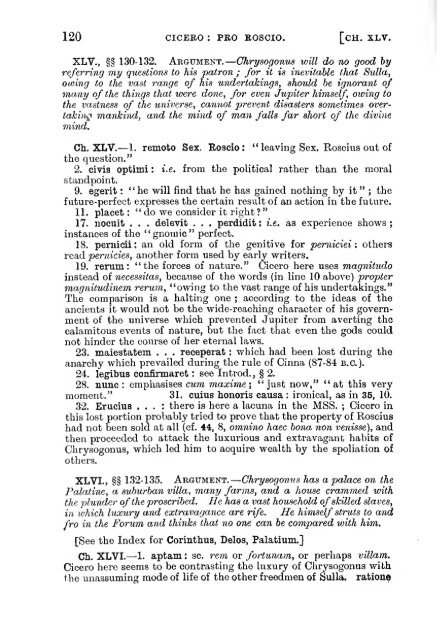Pro S. Roscio Amerino
Pro S. Roscio Amerino
Pro S. Roscio Amerino
Create successful ePaper yourself
Turn your PDF publications into a flip-book with our unique Google optimized e-Paper software.
120 CICERO : PEO KOSCIO. [CH. XLV.<br />
XLV., §§ 130-132. Argcment.—Chrysogonua will do no good by<br />
referring my questions to his patron ; for it is inevitable that Sulla,<br />
owing to the vast range of his undertakings, should be ignorant of<br />
many of the things that were done, for even Jupiter himself, owing to<br />
the vastness of the universe, cannot prevent disasters sometimes overtakin^<br />
mankind, and the mind of man falls far ahort of the divine<br />
mind.<br />
Ch. XLV.— 1. remoto Sex. <strong>Roscio</strong>: " leaving Sex. Rosciiis out of<br />
the question."<br />
2. civis optimi : i.e. from the political rather than the moral<br />
standpoint.<br />
9. egerit : " he will find that he has gained nothing by it " ; the<br />
future-perfect expresses the certain result of an action in the future.<br />
11. placet : " do \ve consider it right ?<br />
17. nocuit . . . delevit . . . perdidit : i.e. as experience shows ;<br />
instances of the "gnomic" perfect.<br />
18. pernicii : an old form of the genitive for pemiciei : others<br />
read pernicies, another form used by early writers.<br />
19. rerum : "theforces of nature." Cicero here uses magnitudo<br />
instead of necessitas, because of the words (in line 10 above) propter<br />
magnitudinem rerum, "uwing to the vast range of his undertakings."<br />
The comparison is a halting one ; according to the ideas of the<br />
ancients it would not be the wide-reaching character of his government<br />
of the universe which prevented Jupiter from averting tho<br />
calaraitous events of nature, but the fact that even the gods could<br />
not hinder the course of her eternal laws.<br />
23. maiestatem . . . receperat : which had been lost during the<br />
anarchy which prevailed during the rule of Cinna (87-84 B.C.).<br />
24. legibus confirmaret : see Introd. , § 2.<br />
28. nunc : emphasises cum maxime ; " just now," " at this very<br />
moment." 31. cuius honoris causa : ironical, as in 35, 10.<br />
32. Erucius . . . : there is here a lacuna in the MSS. ; Cicero in<br />
this lost portion probably tried to prove that the property of Roscius<br />
had not been sold at all (cf. 44, 8, omnino haec bona non venisse), and<br />
then proceeded to attack the luxurious and extravagant habits of<br />
Chrysogonus, which led him to acquire wealth by the spoliation of<br />
others.<br />
XLVL, §§ 132-135. Argument.—Chrysogonvs has apalace on the<br />
Palatine, a suburban villa, many farms, and a house crammed with<br />
the plunder ofthe proscribed. He has a vast household ofskilled slaves,<br />
in lohich luxury and extravagance are rife. He himself struts to and<br />
fro in the Fonim and thinks that no one can be compared loith him.<br />
[See the Index for Corinthus, Delos, Palatium.]<br />
Ch. XLVL— 1. aptam : sc. rem or fortiinam, or perhaps villam.<br />
Cicero here seems to be contrasting the luxury of Chrysogonus with<br />
the unassuming mode of life of the other freedmen of SuUa. ration^<br />
"

















